History Lesson: Andrew Wray on the wave pools that that kicked off the dream
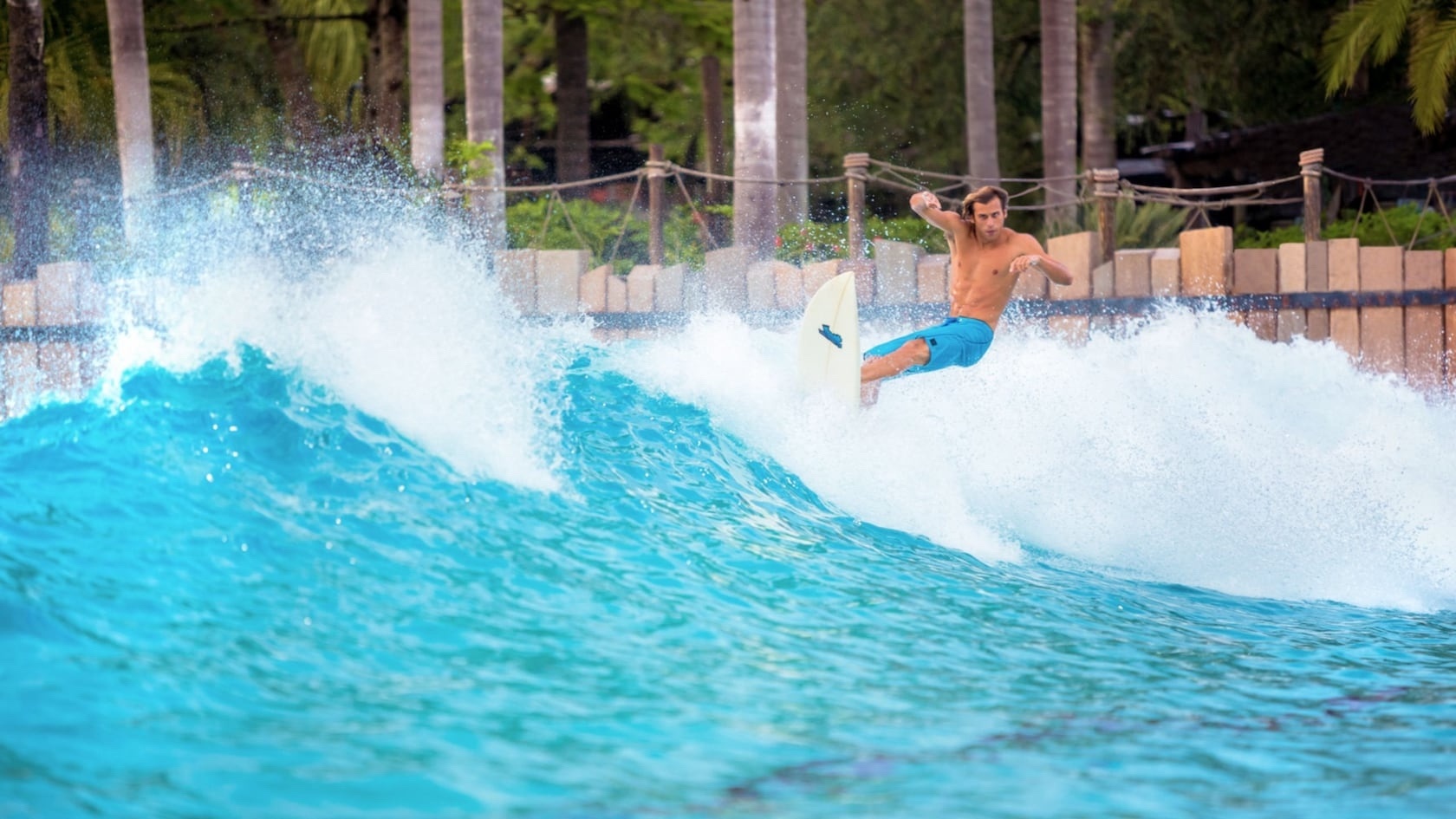
Editor’s Note: When surfing first hit the wave pool, it was most likely into one that Andrew Wray had a hand in designing. From Typhoon Lagoon to Sun City to Dion Agius’ Dubai pool of choice, Andrew has played a role in creating surf. Now with the launch of Endless Surf, he was kind enough to give us a little rewind time to provide a brief history and touch on those key moments that have molded surf parks into what they are today.
I’ve been involved in building wave pools for decades, more than I care to remember, but it is clear to me there’s been a steep change in the last few years and the surf park industry is really starting to find its stride. I don’t need to talk to you about the explosive growth and global appeal of surf driving the boom in new developments, rather, it has caused me to reflect on the rich wave pool history throughout the decades.
Maybe you’ll be surprised to learn that wave pool history dates back to the 1870s with the King of Bavaria’s underground labyrinth that made ripples while people socialized in a grotto. Or, maybe you’re more familiar with Tempe, Arizona’s Big Surf, perhaps considered the “original” surf wave pool in 1969. Both examples were milestones, and there’s certainly a lot of history to unpack there. However, there’s an era within the history of wave pools that was critical in setting the foundation for technological success that often goes unrecognized.
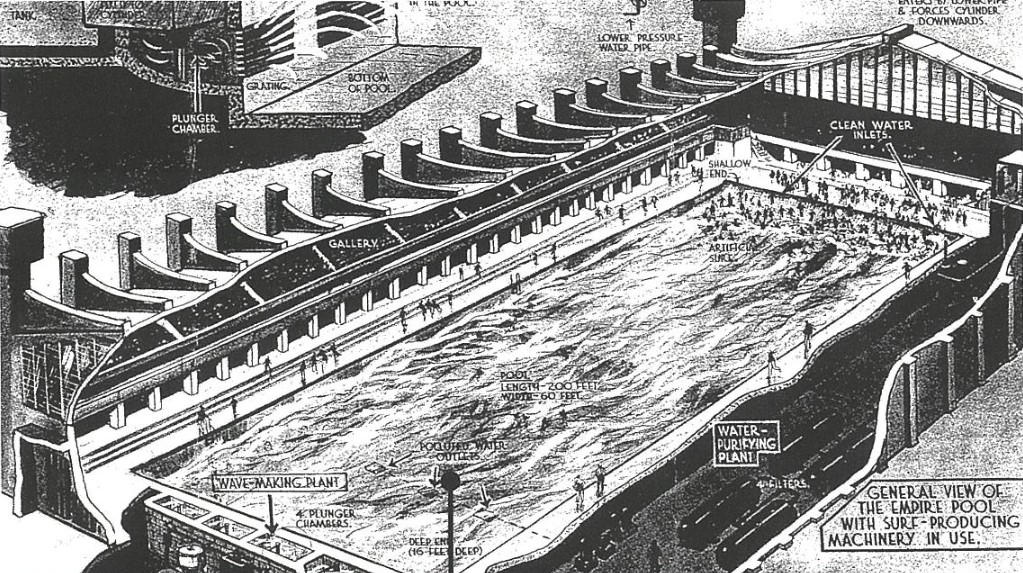
A 1934 illustration of a London wave pool concept. Although not meant for riding, they are getting close…
I’m delighted to see the latest developments in waves because it is how my career started back in the 1970s at my father’s engineering firm Barr + Wray of Glasgow. Soon I was joining forces with Geoff Chutter and have been a Partner at WhiteWater (Endless Surf’s parent company) for 35+ years. I’m proud to have been a part of this rich history of making waves, along with so many others in the industry. Waves have been a core part of the WhiteWater portfolio of products all that time, and the reality is that wave pools today are based upon ground-breaking wave technologies from the past.
However, Endless Surf’s precision surf waves have seen significant evolution from our existing technologies. Although waves can be made in a number of ways, there are some foundational aspects of wave-making that are common to almost every wave system. To understand these foundations, we must look back in wave pool history toward the bright engineers and businesspeople that got us to this point.
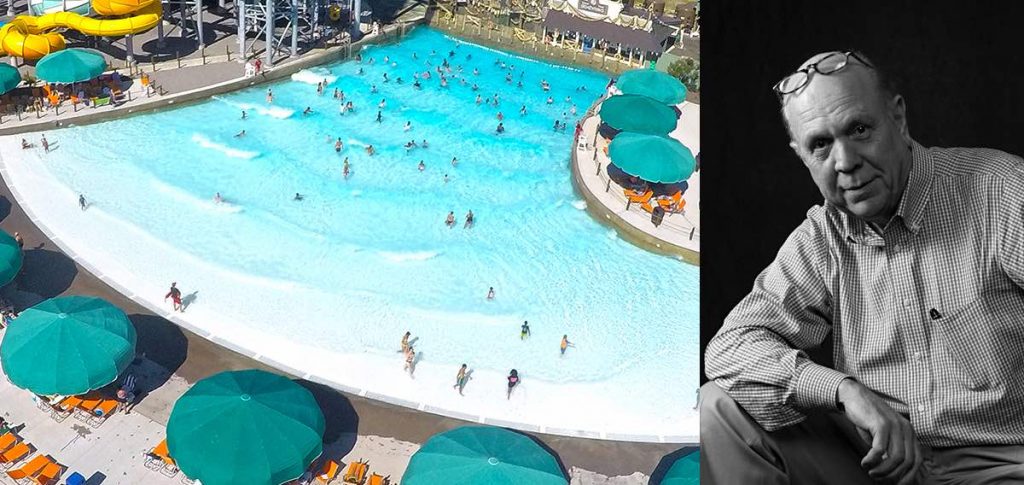
The Golden Years of Wave Pool Research & Development
Flashback to the 70s and 80s and you’ll find some amazing minds working hard within the world of wave pools. It all started with two minds from Berlin University in 1967 who are dubbed the “original inventors” of the pneumatic wave system, Dr. Siegfried Schuster & Professor Christian Boes. Recognizing the opportunity presented by this technology, wave pool pioneer Gary Zuercher patented and commercialized the Schuster & Boes wave system.
Mr. Zuercher, eventual founder of Wavetek, said, “In 1967, we met with Schuster and Boes about the system they created with the purpose of testing ship hulls and wave action on various things. We ended up signing an agreement to use their technology, patent it, (US3629877A) and commercialize it for building wave pools. Being the first technology of its kind, the patent we acquired was based on how we made waves in the system, mainly related to the finesse of wave sequencing and timing. At the time, no one else knew how to do this and our patent was iron clad.”
Wavetek’s first pneumatic wave pool project opened at Point Mallard Park in 1970 in Decatur, Alabama (still in operation today!). The tale is that Decatur mayor, Gilmore Blackburn, saw enclosed wave-making pools in Germany and was inspired to build one as a tourist attraction for his city. They claim to be America’s first wave pool but really that title belongs to Big Surf in Tempe, Arizona which opened a year early using a different technology (more on that later). Most notably, the Alabama project was followed by a Wavetek installation at the famous Wet ‘N Wild Orlando, which was open from 1977 to 2016. This project is often thought of as the world’s original “waterpark”. Gary Zuercher ran his company Wavetek, until 1987 when Herb Ellis from Aquatic Development Group bought it. By the time of the acquisition, Wavetek had built 90+ wave pools off of their patented tech.
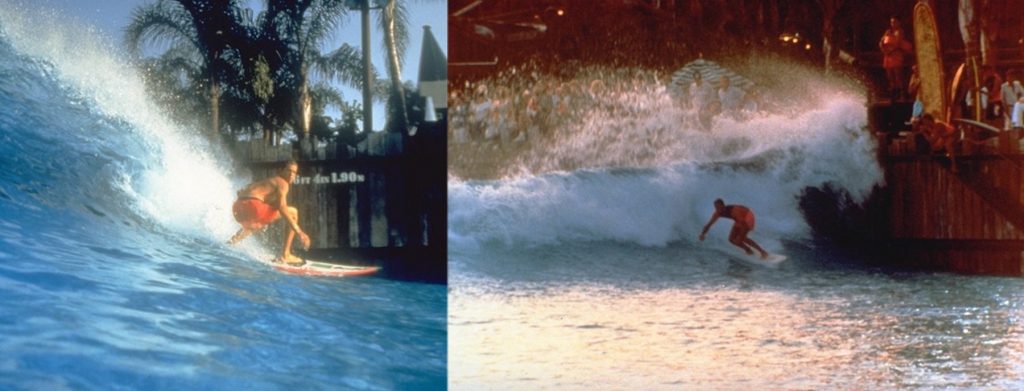
Since the early days within our industry, ADG has been an important player when it comes to making waves. In conversation with Jim Dunn, President of ADG, he notes the long history that his company has had in innovating pneumatic systems, setting foundations for where we are today.
He says, “Pneumatic wave generators have been a reliable way of making waves for nearly 60 years. The reality of it is, as it relates to the true applications on surfing in particular, you can easily trace that heritage back to the 1980s with innovations seen in wave sequencing and overall system performance.”
The ADG acquisition of Wavetek was about the time I was launching Barr + Wray Ltd in North America and, just as Herb bought Wavetek, I brought my waves to expand WhiteWater’s portfolio. The next year, we were awarded Disney’s Typhoon Lagoon project after their worldwide search for the best wave pool technology to develop for their site in Orlando, Florida. After being impressed with the presentation from Matthew Rea of Edinburgh Designs at Edinburgh University, Disney selected Barr + Wray’s concept and WhiteWater’s ability to deliver. Ultimately, the Typhoon Lagoon system (also still operating today and holding surf events) was a major precedent for our industry and wave pool history. Dubbed the “pump & dump”, the technology is a combination of pneumatic and hydraulic technology. Essentially, it fills a series of chambers with water and sequentially pushes out water from the chambers to create surf-able waves with varying patterns.
Real World Waves: The 90s and Beyond
After Typhoon Lagoon opened in 1990 and we were able to successfully leverage the pneumatic technology developed in connection with Typhoon Lagoon in other projects. The technology has continued to improve with each subsequent project resulting in surf park technology we see being offered to today’s customers. I’m really proud how WhiteWater has made man made waves accessible around the world. With 300+ wave pool projects worldwide over the last 30 years, our team has continued to innovate and improve our technology, providing our clients state of the art technology that will last well into the future. There are a few projects that come to mind when I think about what helped pave the way for today’s successful surf parks. Importantly, all of them include wave dampening, an important feature that was missing at the Big Surf installation, that caused serious issues for the operator. All our projects rely on sequencing to provide a whole range of different wave patterns whether for pneumatic or hydraulic wave systems.
With 300+ installations worldwide, it’d be a challenge to list them all. But here are a few other examples of this wave pool history in action…
Sunway Lagoon – Bandar Sunway, Malaysia (1992)
Roaring Lagoon at Valley of Waves – Sun City, South Africa (1993)
Caribbean Bay at Samsung Everland – Yongin, South Korea (1995)
Breakers Bay at Wild Wadi Waterpark – Dubai, UAE (1998) by Murphy’s Waves
Pushing the Limits of Wave Pool Innovation
All in all, these pools pushed the limits of what was possible and still operate reliably today, which is a true testament to the technology. That’s not to say we’ve not been developing our tech, and I’ll round out this part one of two by mentioning Endless Surf. Launched in early 2020, Endless Surf is an extension of the tech we’ve used in hundreds of pools around the world and has a straight-line heritage to Typhoon Lagoon and others. Endless Surf, dedicated specifically to surfing, has added finesse and power to make truly flexible operations and reliable waves a reality. Plus, it is backed by the same commitment to our customers, and their success, that has been our calling card at WhiteWater for the past 41 years.
Stay tuned for more of the technological developments which have made Endless Surf possible in part 2.
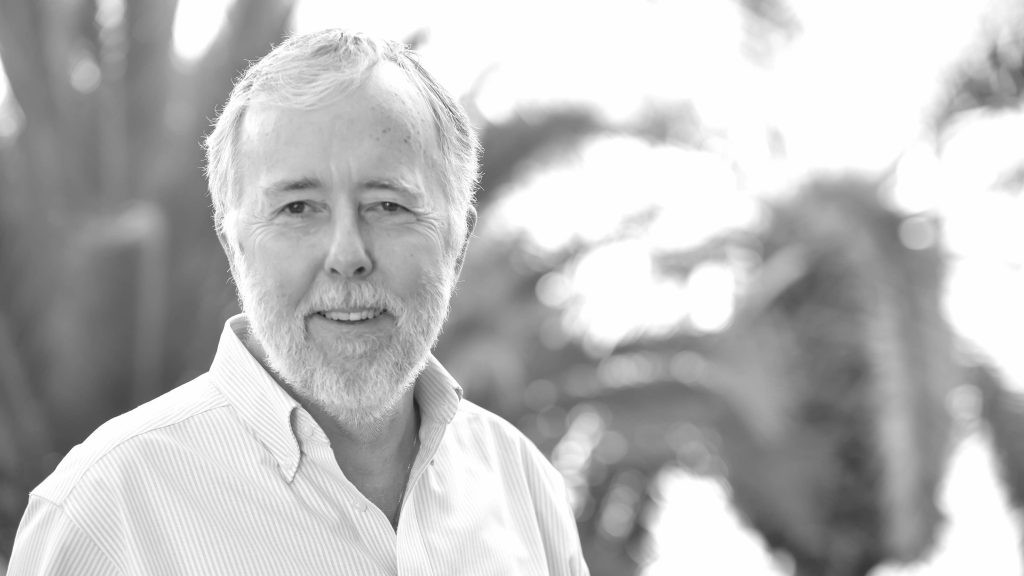
Related Coverage
